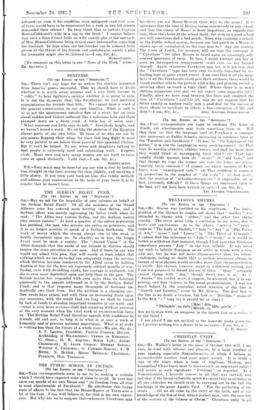THE PUBLIC SCHOOL IN FICTION.
LTo vas Einem or THE " Seitcraroa."1
81s,—Your correspondents seem to me to be making a mistake which I should have expected some of them to avoid. In your last issue one speaks of his own House and " its freedom from all that is most objectionable at Fernhurst." He attributes this happy state of affairs to the fact that the Houee-Master or Tutor sees a lot of the boys. I can well believe it, for that is my own experi- ence. But why are we to suppose that—wherever Fernhurst may
he—there are not Home-Mosters there who do the some? It Is notorious that the tone of Humes varies enormously in any sehool, and that the choice of Home is more important, as regards this tone, than the choice of the school itself; for even in a good school you will sometimes find a had patch. Then why condemn a school, or the Public School system, because one bad patch in a House is shown up—or caricatured, as the case may be? Any one reading The Loom of Youth, for instanee, will see that the contempt of " Caruthers " for other Houses is based upon an amazingly self- centred ignorance of them. In fact, I doubt whether any boy of such an introspective temperament could ever nee far heyond himself. Again (wherever Fernhurst may be), is it not true that the " Caruthers " type has been very formally boycotted by the leading boys in quite recent years? I am sure that if all the mem- bers of all the Fernherets could give their evidence, there would Is. found another side to the picture with a fine and growing record of untiring effort to reach a high ideal. Where there is so much obvious suppressio yeti may we not expert some suygestio foleil Finally, after we bare read between the lines and analysed the tone of " Caruthers " and his set, may we not suppose that his bitter enmity to masters really says a good deal for the success of their efforts to inculcate in others a fine conception of life and






































 Previous page
Previous page